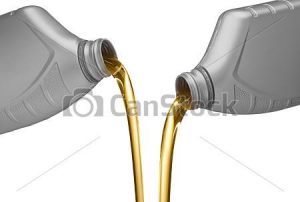From the Editor….
Dave, would you please keep this oil discussion going?
Questions….. Should we use synthetic in our old cars? What about the question of single-weight oil vs multi-weight oils in our old cars, which is best and why? You have mentioned the moisture collecting in our car’s oil pans, especially during winter storage, should oil types come into the conversation here? What about this whole question of 600 weight in our old differentials? What should we use and is 600 weight really 600 weight? Thanks Dave.
Gary, good questions.
 The question of synthetic oil in our old cars is a good one. Like any selection of engine oil, it comes down to the application.
The question of synthetic oil in our old cars is a good one. Like any selection of engine oil, it comes down to the application.
The quality of engine oils has improved dramatically since our antique cars were manufac-tured. The multi-viscosity high detergent oils available today are vastly superior to the oils availa-ble when these cars were new. Not that many years ago, engines were full of sludge and varnish from engine oil deposits. Cars needed to have the engines flushed with flushing oil during an oil change.
The additives and detergents in engine oils still break down, requiring oil changes. This happens more quickly under “severe” driving conditions. Older, carbureted vehicles with open crank case ventilation require more frequent oil changes. The fuel mixture of carbureted engines is not as well controlled as the fuel mixture of modern computerized fuel injected en-gines. Unburned fuel in carbureted engines and early fuel injected engines will dissolve in to the engine oil. Modern engines have sealed crankcases. Older cars have open crankcase ventilation, leaving an opportunity for dust and dirt to migrate in to the engine oil. Because of these reasons, oil needs to be changed more frequently in these older engines than it does in modern engines.
 I have had a number of people tell me they will not use synthetic oil, because they think it will leak out. If your engine already leaks oil, this is true. Synthetic oil will not cause new leaks in an engine. If the engine has sound seals and gaskets, synthetic will not leak any more than conventional oil.
I have had a number of people tell me they will not use synthetic oil, because they think it will leak out. If your engine already leaks oil, this is true. Synthetic oil will not cause new leaks in an engine. If the engine has sound seals and gaskets, synthetic will not leak any more than conventional oil.
Synthetic oil is superior to conventional oil for lubricating and cooling the moving parts of the engine.
If the vehicle has a fairly new engine I would be more inclined to use synthetic oil. The parts and machining cost to rebuild an engine can quick-ly pass $5,000. Synthetic oil is a relatively inexpensive way to protect this investment.
Some vehicles, like air cooled Volkswagens, were designed to use straight weight oil. I have been told multi viscosity oils can foam up in these en-gines, and only straight weight oils should be used. I use straight 30 weight synthetic engine oil in my John Deere Tractor.
Moisture will condense in the crank case as a byproduct of combus-tion. This moisture will remain there until it evaporates away due to engine heat. The engine needs to be run for a while fully warmed up for this to hap-pen. If the car is not driven much, it makes sense to change the oil before putting the car away for winter storage.
There are many factors to consider when choosing an engine oil. The type of driving, number of miles driven in a driving season, the condition of the engine, oil consumption of the engine and cost of the engine oil should all be considered.
Ultimately, it is up to you to decide if the extra protection of synthetic engine oil is worth the extra cost.
Next month I will talk about gear oils.
Editor’s notes….. Watch the monthly VAE auction, you will find some great oil deals. Much of the time the price is half or less what you would pay at the store and the items are high quality, new products.


Leave a Reply